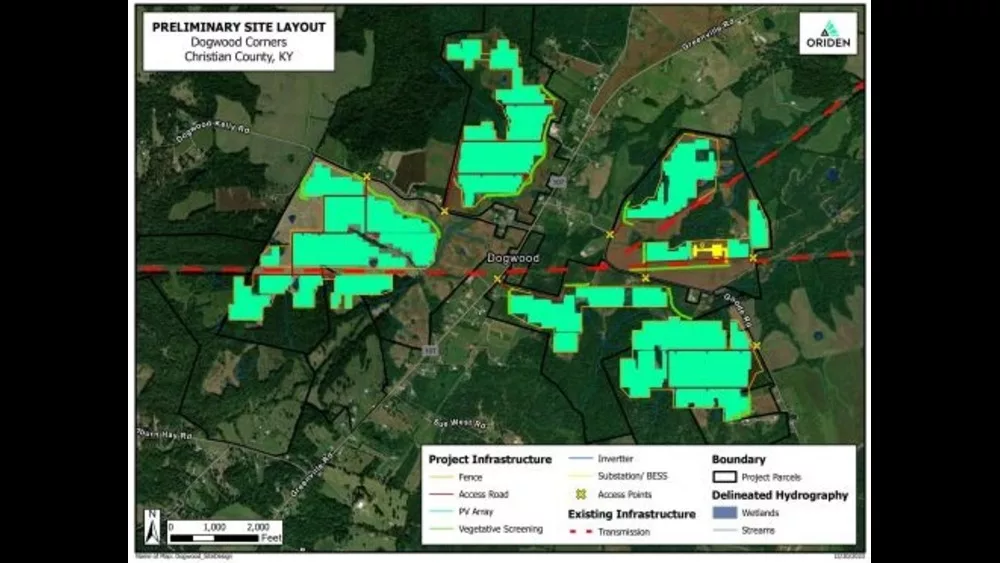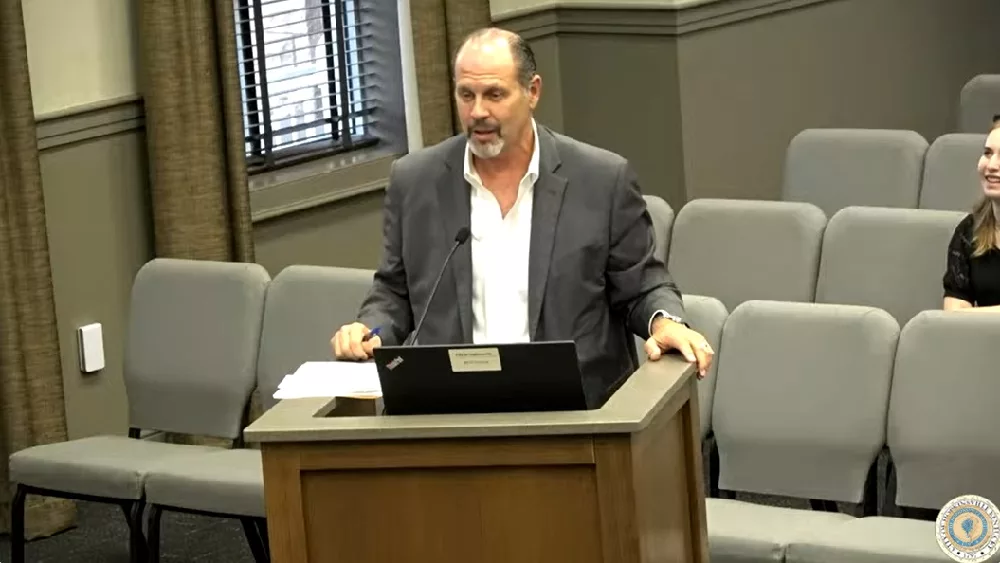
In a 37-page order issued late Friday afternoon, March 8, the Commonwealth of Kentucky and its Kentucky State Board on Electric Generation and Transmission Siting ruled in favor of Dogwood Corners LLC — conditionally granting its application for a construction certificate of a 670-acre, 125-megawatt merchant plant based in Christian County.
These conditions, however, are voluminous, and come after a major hearing was held early February in Frankfort.
The project’s current proprietor, Oriden, must adhere to 33 rules of engagement:
— A final site layout plan must be submitted to the Siting Board, upon completion of the final site design, with any changes provided in revised graphics.
— Any changes to the projects boundaries must be submitted to the Siting Board.
— The Siting Board will determine whether any deviation in the boundaries creates a materially different pattern, or generates a magnitude of impact.
— Prior to construction, officials shall provide a finalized Emergency Response Plan to Christian County’s fire districts, first responders and county emergency management, and must provide site specific training upon request.
— Dogwood Corners, or its contractor, will control all access to the site during construction and operation. All entrances will be gated and locked when not in use.
— Appropriate signage must warn trespassers adequately, and be particularly visible to the public, local residents and business owners.
— A security fence must be installed prior to activating any electrical implements, and the substation on site must have its own security fence.
— Existing vegetation between new solar arrays and nearby roadways and homes must be left in place to the extent feasible, in order to help minimize visual impacts.
— The planting of native evergreen species must be used as a visual buffer, and where this isn’t adequate, vegetation 10 feet thick reaching six feet tall at maturity in four years (or less) must be added.
— At least two acres of native, pollinator-friendly species must be cultivated on site.
— A more robust visual screening plan must be developed than the one originally proposed in the application and all maps, and all vegetation that dies before decommissioning must be replaced.
— Any adjacent property owners indicating a visual buffer is not necessary must be confirmed by Dogwood Corners officials, with written consent provided to the Siting Board.
— All aspects of the construction schedule must occur between 8 AM and 6 PM Monday through Saturday. Higher levels of noise must be limited between 9 AM through 5 PM on weekdays only. All other activities can occur between 7 AM and 10 PM Monday through Sunday.
— All pile-driving construction within 1,000 feet of sound receptors requires noise suppression.
— All residents and businesses within 2,400 feet of the project must be notified by Dogwood Corners of its construction plan.
— Dogwood Corners must comply with Christian County’s drafted and ratified ordinance, alongside any other applicable local ordinances. This includes current and lesser setbacks, which must be agreed upon and submitted to the Siting Board before construction begins.
— Dogwood Corners must fix, or pay for repairs, on the damage of roads and bridges resulting from transports to and from the site, while complying with all laws and regulations of said roadways.
— Ridesharing between construction workers must be used when feasible, in order to mitigate potential traffic delays at peak morning and evening hours.
— All required traffic permits must be acquired through the Kentucky Transportation Cabinet, and other traffic concerns must be handled through the Christian County Road Department.
— Construction equipment must follow the best management practices related to fugitive dust, and could require the use of water trucks. Dust impacts must be kept at a minimal level.
— In the event of transferred ownership or abandonment of the project, Dogwood Corners and/or its successors must request explicit approval from the Siting Board, with notice provided to the Christian County Fiscal Court.
— Dogwood Corners must file a complete and explicit decommissioning plan with the Siting Board at least one month prior to construction, involving the removal of all above and below-ground components, regardless of depth.
— Notice should made to the Siting Board, should at any point during a 730-day period more than 20 percent of facilities are replaced, and any disposal or recycling of equipment must meet local laws and requirements.
— And Dogwood Corners must provide and maintain a Complaint Resolution Program, and contact information for responsible individuals must be made available to the Christian County Community and Development Services.
A copy of this order must be sent to all adjoining landowners to the project, and any non-compliance could impact the legality of the project.
If constructed, the proposed facility will invest more than $192 million in Christian County, contain at least 270,000 photovoltaic solar panels, 35 inverters, a battery energy storage system and a substation transformer, and it will interconnect with a 500-foot non-regulated transmission line through the Tennessee Valley Authority switchyard. It would require the clearing of almost 130 acres of vegetation, as well as two structures.
In all, the land and its adjoining acres includes 17% for agriculture, 18% of agricultural/residential, 60% residential, and 4% religious and cemetery. It also consists of eight parcels secured in six real estate agreements — but does not have any residential neighborhood, school, hospital or nursing home facility within 2,000 feet from the project.
In the order, the Siting Board noted the Kirkland Report found that “based upon a comparative analysis, the solar facility will have no impact on the property values of abutting or adjoining residential or agricultural properties.” However, in a concurring opinion from Ben Bolinger and Ben Payne, they expressed concern and disagreement with this conclusion — noting the sales data used in the report uses adjoining tracts next to “proposed” solar farms, and not data in Kentucky from homes resold after solar farms are built.
During the project’s construction phase, officials estimate more than 300 temporary, full-time jobs will be necessary to complete the build, resulting in more than $18 million in payroll and fringe benefits. Another 70-plus tangential jobs will add another $3.9 million in payroll.
During the operational phase, Dogwood Corners will employ around four jobs with a total payroll of $466,000. Without an Industrial Revenue Bond or Payment In Lieu Of Taxes through the Christian County Fiscal Court, there is expectations of paying around $5.2 million in local taxes, and $6.7 million in state taxes, over a span of 36 years.
The Siting Board used third-party BBC Research and Consulting in its findings.
FULL DOCUMENT: 20240308_PSC_ORDER





